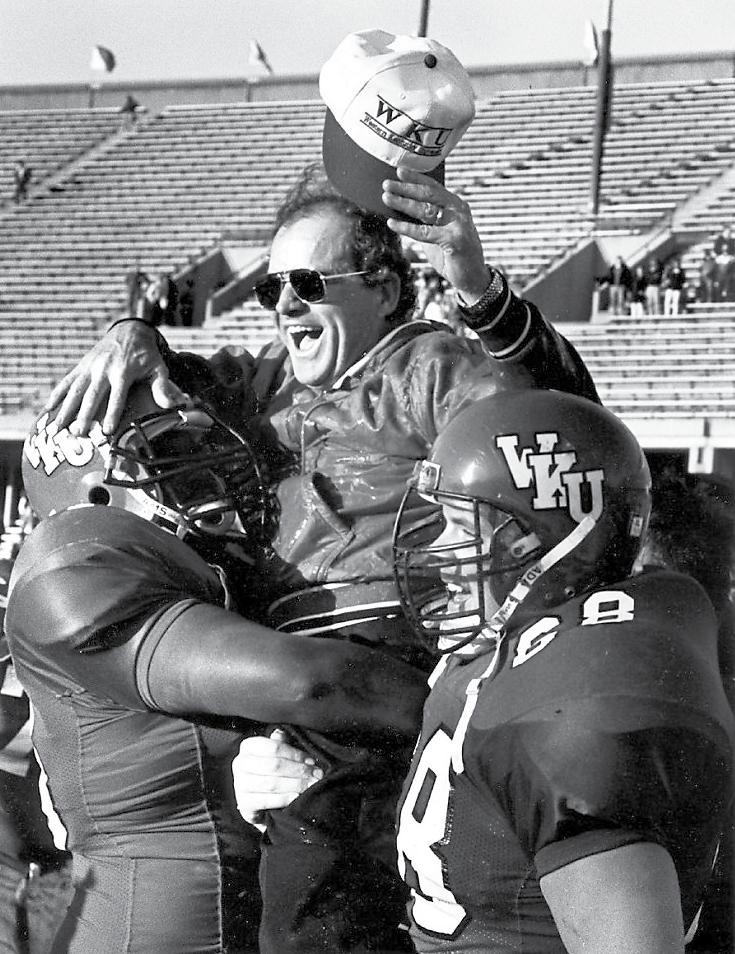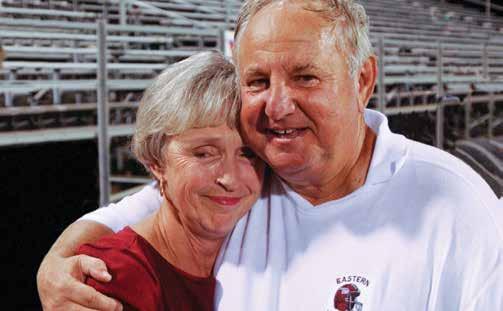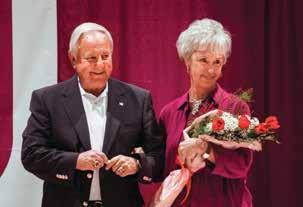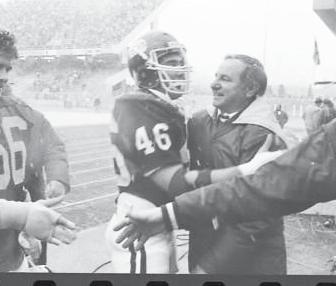
6 minute read
ADVERSARY TO ADMIRER
by Jack Frost
Roy Kidd has received every coaching award, including induction into six Halls of Fame for his brilliant 39-year Eastern career, but the reverence and respect his former coaching adversaries hold for him may be his highest honor.
Two of the most respected and recognized coaches that led their teams against Kidd’s Colonels are former Austin Peay and Middle Tennessee head coach James “Boots” Donnelly and former Western Kentucky head coach Jack Harbaugh.
Donnelly began his college coaching career in 1977 at Austin Peay, where he was a four-time OVC Coach of the Year. After his second season with the Governors, Donnelly returned to his alma mater at Middle Tennessee, where he served 20 years (1979-98) and rebuilt the Blue Raiders program into a perennial OVC and NCAA Div. I-AA championship contender.
“Every player and every coach always knew the importance of the EKU game,” said Donnelly. “We knew we could not make a mistake. Our mental and physical preparation was thorough.” Kidd and Donnelly opposed each other 24 times between 1977 and 1998, with EKU winning 18, most of the battles closely contested until the final horn.
The most memorable matchups for Donnelly came in 1984 when Middle defeated Eastern twice on Hanger Field: 22-10 in the regular season and 27-10 in the first round of the playoffs. “Beating Eastern and Roy twice in the same year at their place is a tall mountain to climb, but we did it,” Donnelly recalled.
Donnelly, who joined Kidd in the College Football Hall of Fame with his induction in 2013, has nothing but admiration and respect for his friend. “Everyone who has coached in the OVC should thank Roy for what he did to promote the game and make the great game of football such an integral part of college athletics. Roy deserves all of the accolades and honors he has received.”
Jack Harbaugh is the well-known football family patriarch and father to Jim and John Harbaugh, who have both been highly successful college and NFL head coaches. The elder Harbaugh enjoyed a distinguished 40-year coaching career that included a head coaching stint at Western Michigan and assistant coaching positions at six universities, including Morehead State, and seven years as defensive backs coach under Bo Schembechler at Michigan, where he helped lead the Wolverines to five Big Ten titles.
During his 14 years (1989-2002) in Bowling Green, the Commonwealth’s fiercest football rivalry, Eastern vs. Western, still existed. Perhaps the most important meeting during Harbaugh’s tenure occurred in 1997, when the Hilltoppers ended Eastern’s season with a win in the I-AA playoff quarterfinals. But Kidd’s teams claimed a 7-6 advantage in the series with Harbaugh’s Hilltoppers.
Harbaugh’s teams lost to Eastern the first four times they met. It wasn’t until the season opener in 1993 that he was able to defeat Kidd’s Colonels. The 15-10 win at Roy Kidd Stadium gave Harbaugh reason to finally celebrate.
“After the game and all of the celebrating was over, I decided to ride back to Bowling Green with my family and let one of my assistants go back with the team. As we were heading back, we stopped at this little convenience store outside of town, and I went in to buy a beer. I was still wearing my
Western shirt and cap. I went up to the counter and asked if I could have a beer. The clerk told me we were in a dry county and he couldn’t sell me a beer. I explained who I was and told him that my team had just beaten Roy Kidd and EKU for the biggest win of my life and I really would like to have a cold beer to celebrate the occasion. He told me he was sorry, but he wasn’t going to risk losing his license. So, I left the store and went back to the car. Before we could pull away, we heard a thumping on the window, and I rolled the window down to see this guy standing there, and he said, ‘Buddy, I’ve never seen a guy that needed a beer more than you.’ So, he reached into his coat and pulled out a beer.
“The excitement of finally being able to beat that man and finally finding a way to put more points on the scoreboard than what he got is a special moment in my career.”
Both Harbaugh and Kidd retired from coaching after the 2002 season, and when Eastern held a retirement celebration for Kidd, Harbaugh and his wife attended. Harbaugh said he wanted to be there to honor his friend and coaching colleague for the great legacy he left Eastern and, more importantly, the legacy he left football.
“I’m a great football buff, and the game of football is so important to me,” Harbaugh said. “By the time Roy Kidd retired in 2002, he had made me a better football coach and left football a better game.” n
ABOVE LEFT: Hilltopper players lift Coach Harbaugh in celebration of a hard-fought victory, but the Colonels won seven of the 13 games Kidd and Harbaugh were opposing coaches. AT LEFT: Coach Donnelly.


by Marc Kidd
Roy and Sue Kidd Way is a two-way street that sits at a crossroad of moments and memories in front of Roy Kidd Stadium on the campus of Eastern Kentucky University. The memories are rooted in a consistent, loving, competitive spirit displayed at elevated levels over a lifetime of football fields, basketball courts, parades, dorms, dinner tables, fellowship and the Campus Beautiful.

You know them as Roy and Sue. My sister, Kathy, and brother, Keith, know them as Mom and Dad! Today, many EKU students see a stadium, statue and street. But back in the day, students, cheerleaders, football graduate assistants, managers and players saw in them their college mom and dad who provided guidance, kindness and “tough love” when it was required.

Roy was a competitive all-sport athlete from Corbin, Ky. who excelled in football, basketball and baseball. Roy arrived at Eastern after a drive from Corbin with his oldest brother, Earl, who dropped him off after turning onto what would become Roy and Sue Kidd Way. Roy had a suitcase and no idea what his future would hold on the campus he would spend his life.
Sue was a champion majorette baton twirler whose performance was a combination of dance, movement, gymnastics and grace at the front of the band in gyms and on football fields. Baton twirling is as mentally challenging as it is physically demanding, and there is no room for mistakes as you throw the baton into the air and catch it as it hurls back to earth.
Roy met Sue (or “Sue flirted” with Roy in his telling of the story) at Madison High School when he was the football coach 1956-61 and Sue was a student and majorette. Roy’s first year at Madison High followed the Brown vs. Board of Education ruling that resulted in school integration. Amidst that backdrop, the Madison-Model Royal Purples became legendary in Richmond as they racked up wins across the state.
Roy and Sue married in 1961 and, having both been athletes, had no illusion their path would be easy or without hard work. They intuitively understood that great teams have leaders who work together to meet the common goals for the good of the team and embraced their role to be those models for their students.
Dad would organize practices with his daily schedules, and Mom would manage the coaches and players’ wives for Friday’s “brownies and goodies” with the team before each home game. Both Mom and Dad would cheer you on but also “tell it like it is” when you were not getting the job done at home, school or in life.
We lived on campus when Dad returned to Eastern with Mom, me and my sister in 1964, after a year in Morehead. The campus house we lived in sat at the dead-end of Park Drive, where Hanger Field was in view out our front window, and extra points cleared the goal post, with a chain-link fence separating our campus house from the football field. Case Hall was in view, and many days students, players and cheerleaders would stop by to visit or babysit me, my sister and brother, who was in diapers by then.
I remember sitting in the dark watching film with Dad and his coaches, with the smell of stale coffee in the air, knowing he had a player who was in “hot water” coming to chat with him and thinking, “I am glad it’s not me.”
Keith, Kathy and I were at a disadvantage when we got in “trouble” and tried to put a positive spin on the story Dad hadn’t already heard as a college coach in the ’60s. We had an unspoken code of not causing trouble on game day when Mom had her hair in curlers and was putting on her makeup because she could be deadly with a swat on the bottom when you were misbehaving and didn’t think she was watching or listening.

Roy and Sue’s kids are grown with their own families and fond memories from our time in Richmond and as EKU graduates. Dad is now in his 90s, his mind is sharp, and he moves well enough to have won a “cornhole championship” at McCready Manor. If you see a picture of him accepting the trophy, you can see Mom in the background with her arm raised high, cheering him on … after all these years!
That’s my parents: Roy and Sue, a lifetime partnership with three kids and a two-way street! n

Associated Press
Top: Tailback Ed Hairston makes a cut against the grain in the Colonels’ 23-17 win at Boise State in the I-AA semifinal. Above: Linebacker Alex Dominguez (46) receives congratulatory hug from head coach Roy Kidd after making a big stop in the Colonels’ 23-17 win in the 1981 playoffs at Boise State.


Racing results Outdoors
Sports results, 582-4871










